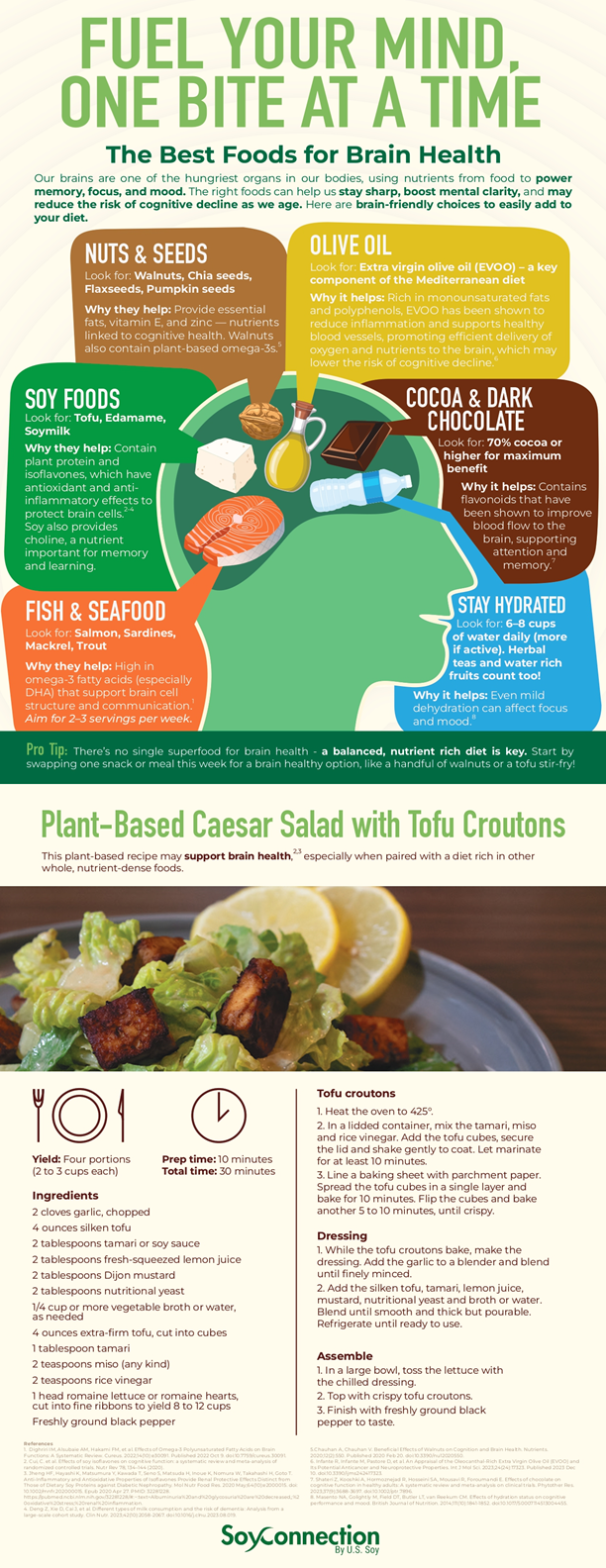By Dr. Jenna Stedman, DCN, RD, CSSD
The brain is one of the hungriest organs in the body, demanding a steady stream of nutrients to function at its best. What you eat doesn’t only fuel your body; it shapes your cognitive performance, mood, and resilience over time. From essential fatty acids that build brain cell membranes to antioxidants that protect against oxidative stress, diet plays a profound role in maintaining brain health across the lifespan. This ability is especially important during demanding times—studying for an exam, preparing for a big presentation, completing a challenging sports activity, or simply aiming to stay sharp as you age.
Although additional research is needed and many existing studies have design limitations, the evidence to date suggests that a healthful dietary pattern may support cognitive function, including improvements in memory and mental clarity, and may help slow age-related cognitive decline.1 Notably, the foods most frequently associated with cognitive benefits are nutrient-dense and confer multiple health advantages, providing a strong rationale for incorporating them into the daily diet.
Below are some of the best foods to fuel your brain, backed by research and easy to include in everyday meals.
Fish and Seafood
Fatty fish such as salmon, mackerel, sardines, and trout contain omega-3 fatty acids, particularly docosahexaenoic acid (DHA), which makes up a large portion of brain cell membranes. Omega-3s support communication between brain cells and are associated with improved memory, mood, and mental clarity.2 Aim for two to three servings of fish per week for optimal benefit.
Soy Foods
Soy foods like tofu, tempeh, edamame, and soymilk are nutrient-rich plant proteins that contain isoflavones; compounds with antioxidant and anti-inflammatory properties. These compounds may help protect the brain from oxidative stress, which contributes to aging and cognitive decline.3,4 Soy is also a source of choline—a key nutrient involved in the production of acetylcholine, a neurotransmitter important for memory and learning.
Nuts and Seeds
These compact powerhouses are a source of vitamin E, zinc, and predominantly unsaturated fats, all of which contribute to brain protection and cognitive longevity. Walnuts in particular are a predominant source of alpha-linolenic acid (ALA), a plant-based omega-3.5 Flaxseeds, chia seeds, and pumpkin seeds also offer brain-friendly nutrients, and they’re easy to sprinkle into oatmeal, smoothies, or yogurt.
Olive Oil
Extra virgin olive oil is a cornerstone of the Mediterranean diet, which has been linked to a lower risk of Alzheimer’s disease and cognitive decline. A predominant source of monounsaturated fats and polyphenols, olive oil may help reduce inflammation and supports the integrity of blood vessels, ensuring that oxygen and nutrients can reach the brain efficiently.6 Use it on salads, vegetables, and whole grains.
Cocoa and Dark Chocolate
Cocoa contains flavonoids that enhance blood flow to the brain and may improve attention, processing speed, and memory.7 The darker the chocolate, the better. Look for varieties that are at least 70% cocoa. A small square or two of dark chocolate can be a satisfying and smart treat.
Hydration
Even mild dehydration can impair focus, short-term memory, and mood.8 The brain is about 75% water,9 and staying hydrated helps maintain its structure and function. Aim for at least 6–8 cups of fluid per day; more if you’re physically active. Water, herbal teas, and foods with high water content like fruits and vegetables all count.
The Bottom Line
Current evidence indicates that no single food can independently optimize brain health. However, a dietary pattern rich in nutrient-dense, whole foods is associated with improved cognitive outcomes, including enhanced attention, mood regulation, memory, and long-term cognitive resilience. Each meal represents an opportunity to provide essential nutrients that support optimal brain function and overall neurological health.

Download Healthy Handout for Patients and Clients
Read SNI Global’s article, Extend Your “Healthspan” with Soy Foods, to learn more about how soy may support cognitive health.
REFERENCES
-
National Institute on Aging (NIA). “What Do We Know About Diet and Prevention of Alzheimer’s Disease?” https://www.nia.nih.gov/health/what-do-we-know-about-diet-and-prevention-alzheimers-disease.
-
Dighriri IM, Alsubaie AM, Hakami FM, et al. Effects of Omega-3 Polyunsaturated Fatty Acids on Brain Functions: A Systematic Review. Cureus. 2022;14(10):e30091. Published 2022 Oct 9. doi:10.7759/cureus.30091.
-
Turana Y, Handajani YS, Barus T, Kristian K, Theodoraliu E, Suswanti I. Comparison of the effects of mixed tempeh with soy tempeh on cognitive function in older people. Front Nutr. 2025;12:1551211. Published 2025 May 12. doi:10.3389/fnut.2025.1551211.
-
Deng Z, Xie D, Cai J, et al. Different types of milk consumption and the risk of dementia: Analysis from a large-scale cohort study. Clin Nutr. 2023;42(10):2058-2067. doi:10.1016/j.clnu.2023.08.019.
-
Chauhan A, Chauhan V. Beneficial Effects of Walnuts on Cognition and Brain Health. Nutrients. 2020;12(2):550. Published 2020 Feb 20. doi:10.3390/nu12020550.
-
Infante R, Infante M, Pastore D, et al. An Appraisal of the Oleocanthal-Rich Extra Virgin Olive Oil (EVOO) and Its Potential Anticancer and Neuroprotective Properties. Int J Mol Sci. 2023;24(24):17323. Published 2023 Dec 10. doi:10.3390/ijms242417323.
-
Shateri Z, Kooshki A, Hormoznejad R, Hosseini SA, Mousavi R, Foroumandi E. Effects of chocolate on cognitive function in healthy adults: A systematic review and meta-analysis on clinical trials. Phytother Res. 2023;37(9):3688-3697. doi:10.1002/ptr.7896.
-
Masento NA, Golightly M, Field DT, Butler LT, van Reekum CM. Effects of hydration status on cognitive performance and mood. British Journal of Nutrition. 2014;111(10):1841-1852. doi:10.1017/S0007114513004455.
-
National Institutes of Health (NIH) / Journal of Biological Chemistry:
Mitchell HH, Hamilton TS, Steggerda FR, Bean HW. "The Chemical Composition of the Adult Human Body and Its Bearing on the Biochemistry of Growth." Journal of Biological Chemistry, 1945; 158:625-637.
